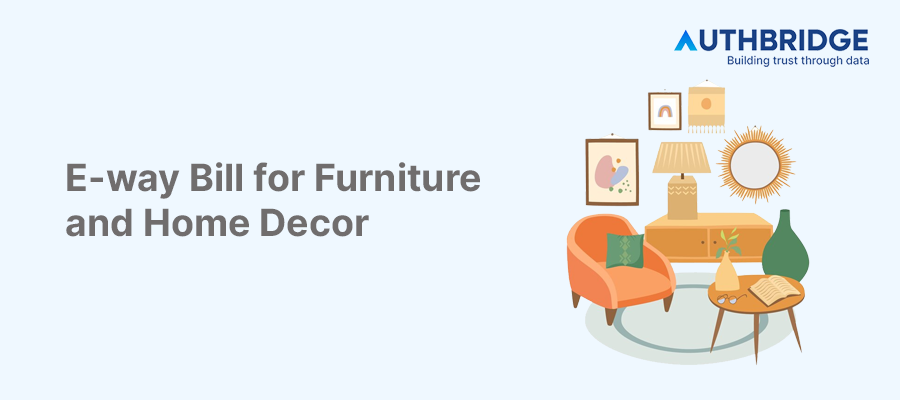A Comprehensive Guide

The E-way Bill is a mandatory electronic document for the movement of goods valued over ₹50,000 across India. It's part of the GST regime to ensure transparency in the transport and delivery of goods, including furniture and home decor items. This system tracks the movement of goods and helps in the reduction of tax evasion.
Importance for the Furniture and Home Decor Industry
For the furniture and home decor industry, the E-way Bill is crucial due to the high value and volume of goods transported. This sector often deals with interstate transportation of bulky items, making compliance with E-way Bill regulations essential. Adhering to these requirements not only ensures smooth logistics but also minimizes the risk of penalties due to non-compliance.
Understanding the E-way Bill Process
When is an E-way Bill Required?
An E-way Bill is required for the transportation of goods with a value exceeding ₹50,000, either in a single invoice or as the aggregate of all invoices in a vehicle. This requirement applies to both interstate and intrastate transportation. For the furniture and home decor industry, this includes the movement of items such as sofas, dining sets, wardrobes, and decorative items, whether for sale, return, or transfer purposes.
Documents Needed for E-way Bill Generation
To generate an E-way Bill, the following documents are necessary:
- Invoice/Bill of Supply: Details of the goods being transported.
- Transporter ID: Required if the transportation is carried out by a third party.
- Vehicle Number: For road transportation.
- Transport Document Number: For rail, air, or ship transport, including the document date and number.
E-way Bill Generation for Furniture and Home Decor
Step-by-Step Guide to Generating an E-way Bill
- Registration: Log in to the E-way Bill portal using your GSTIN.
- Filling Details: Click on 'Generate New' under the E-way Bill section and fill in the details of the consignment, including product name, HSN code, quantity, and taxable value.
- Transporter Details: Enter the transporter ID and the mode of transport with the vehicle number or transport document details.
- Submission: Submit the details to generate the E-way Bill, which will provide a unique E-way Bill Number (EBN).
Special Considerations for Furniture and Home Decor
- Bulk Transport: For large items or bulk transportation, ensure accurate vehicle details are provided to avoid compliance issues.
- Renting of Furniture: When renting furniture, an E-way Bill is required for both delivery and return if the value exceeds ₹50,000.
Compliance and Penalties
Compliance Requirements for Furniture and Home Decor
Businesses must ensure that an E-way Bill accompanies the consignment during its movement. The transporter should carry a copy of the E-way Bill along with the invoice or bill of supply.
Penalties for Non-compliance
Failure to generate an E-way Bill can lead to the seizure of goods and a penalty of ₹10,000 or the tax sought to be evaded, whichever is higher. This emphasizes the importance of adhering to E-way Bill regulations.
Case Studies and Examples
- Renting of Furniture: For a transaction involving the renting of furniture worth ₹60,000, an E-way Bill must be generated for both delivery to the customer and return to the owner.
- Furniture Work Done (Labour + Material): When a business provides a service that includes both labor and materials for furniture work exceeding ₹50,000, an E-way Bill is required for the movement of materials.
FAQs on E-way Bill for Furniture and Home Decor
- Is an E-way Bill required for the movement of furniture within the same city?
- Yes, if the value exceeds ₹50,000.
- Can multiple invoices be clubbed in a single E-way Bill?
- Yes, if they are being transported in the same vehicle and the combined value exceeds ₹50,000.
- What happens if the vehicle breaks down?
- The transporter needs to update the vehicle details in the E-way Bill portal by generating a new E-way Bill with the updated vehicle number.
Conclusion and Best Practices
The E-way Bill system is a critical component of GST compliance for the furniture and home decor industry. Understanding and adhering to its requirements ensures smooth business operations and avoids legal complications. Best practices include:
- Regularly updating the E-way Bill portal with accurate transportation details.
- Training staff and transporters on E-way Bill regulations.
- Keeping abreast of any changes in E-way Bill rules and regulations.
By following these guidelines, businesses can ensure compliance, streamline their logistics operations, and focus on growth and customer satisfaction in the competitive furniture and home decor market.
Consideration | Details |
Value Threshold | ₹50,000 |
Documents Required | Invoice, Transporter ID, Vehicle Number |
Special Cases | Renting, Bulk Transport |
Penalty for Non-compliance | ₹10,000 or tax evaded, whichever is higher |
By understanding and efficiently managing the E-way Bill process, businesses in the furniture and home decor sector can navigate the complexities of GST compliance, ensuring smooth operations and contributing to a transparent and efficient tax system.
Category

Abhinandan Banerjee
(Associate Manager - Marketing)
Abhinandan is a dynamic Product and Content Marketer, boasting over seven years of experience in crafting impactful marketing strategies across diverse environments. Known for his strategic insights, he propels digital growth and boosts brand visibility by transforming complex ideas into compelling content that inspires action.



